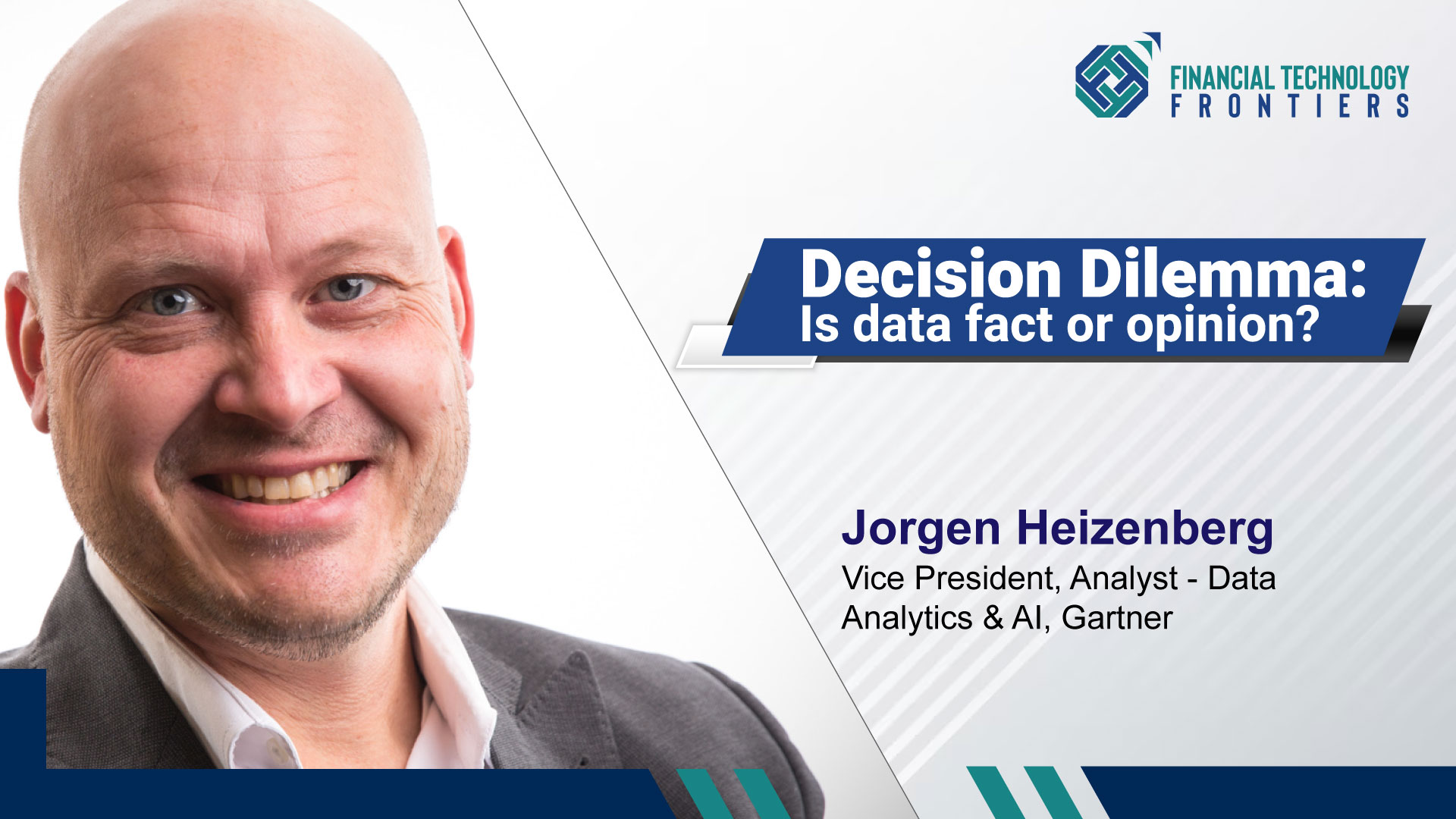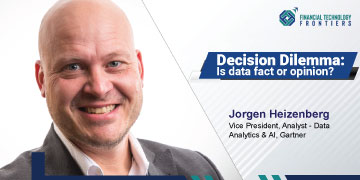As data analytics is becoming the base infrastructure of all business activities, it is critical to have data coaches and mentors, says Jorgen Heizenberg, Vice President, Analyst – Data, Analytics & AI at Gartner. Excerpts from an interview:

Manoj Agrawal: What is the key to successful data analytics?
Jorgen Heizenberg: In my experience, it is not about tools and technologies, but it is about people as I have worked on many data analytics initiatives. Success lies primarily in having the right set of people with the right skills who can handle challenges and areas of change management – accepting data analytics as a different way of working as supposed to working with technology challenges. Technology challenges were easier to overcome in comparison to the resistance for adopting data analytics by organizations. To a certain extent, the banking industry is focused on the first part, ie, technology implementation. It is critical to understand how data analytics works, influences decision-making and how to embed this into the workflow. The change management component is often overlooked. But you need both to be successful.
With this explanation, should a course in data be a part of a leadership program?
Data analytics needs to be part of any leader. All organizations today want to be more data driven. That means they need to be educated on what it really means to be data driven. Everybody in the organization needs to data literate. If you are in the supply chain, one should understand how data can remove bottlenecks, or improve delivery time. A CFO must know how data analytics can help improve margins; a CMO should understand how data can help reach new customers. All leaders in an organization should gain knowledge about how they can leverage data analytics to improve business in their role. Data analytics should not be limited to the leaders alone. In a data driven culture of an organization, every participant (employee) should be on the same page when it comes to data analytics. That means a top-down approach along with a bottom-up approach. Communities around data and analytics start to emerge around chain community and finance and HR.
What are the roles of data coaches and data mentors?
The coaches and mentors will work with the data analytics communities and help them understand data analytics with respect to their role through education and training. They will help them understand the difference between correlation and causation. They will support them and enable them in a data-driven economy.
AI is being used to do shortlisting and hiring. How do you bring diversity to the equation and still use AI?
If you feed the same type of data into AI or train the AI with the same kind of programs, the AI will become single-focused. Diversity can be introduced through diverse data sources. This is the responsibility of people who train the algorithm. Thus, diversity becomes more complex and whole. It avoids vices that exist when you use a single data source and a single developer approach.
Any other observations on employees or HR?
One of the observations that came to me during my research is that companies that have employees with diverse cultural backgrounds have the highest retention rates. That goes beyond legacy diversity-gender or ethnicity for e.g., staff diversity, eg, some people are extroverts, some are introverts, but if you bind the two, will get better results. Some have more analytical powers, some are emotional; all these diversities can complement each other.
Human beings are often described as irrational beings. Will data change that in the near future? Do you think rationality is a good foundation for society?
If you look at history, an English civil servant, philosopher, and political economist named John Stuart Mill had identified human beings as very rational. He was talking about homo-economicus. Humans only looked at the facts and based on those facts, they would decide. Another school of thought emerged – like that of Freud – who said that everything one does is irrational. People do not make decisions only on facts. So, the first one is much more about the facts, and the second one is more about emotions. The current school of thought is that they are both wrong. People are irrational, all make the same mistakes. So, we are sort of predictably irrational, which was the postulation of Dan Ariely. And if you bring that to the area of data analytics, if you give people data and ask them to decide, it may not be fruitful as one needs to have the skills of understanding and interpreting the data correctly (data literacy is crucial).
With the huge and growing amount of data becoming available, do you expect a shift from emotions to data-based decisions?
The implicit part of emotion still outweighs the explicit parts. People say facts are just an opinion. People are not accepting facts as a fact, they are challenging the facts – your source, definition or where is the data coming from. People are rational, but we do make similar mistakes, we all suffer from confirmation bias or, sunk cost fallacy and all the other biases that exist and that will impact us. So, in boardrooms when they have to make big decisions, billion-dollar decisions, they try to become more fact-based. And that is also the mission that we need to be on.
Are people feel comfortable with an algorithm making a decision or a human being making a decision?
Most would still feel comfortable when a person decides rather than an algorithm deciding. Although one can argue that the algorithm is purely fact-based and has no biases. Well, predictably irrational. I guess you would not be able to have an emotional attachment with the decision making.
Why do we trust people more than an algorithm?
It is all about trust. Do you trust an algorithm to make the right decision? Do you trust the data? Do you trust the way the algorithm is being trained? What is trust? Is your trust same as my trust? Is your truth, my truth?
Let’s bring it to banking, to making decisions on a loan. Do we trust when an algorithm decides, or do we trust it more when a person that has worked for the bank for 30 years makes that decision? That is the question that we need to answer.
It is always about augmentation. It is about the algorithm working with the human to make the decision. It is not one or the other, rather it is one and the other. What I am hearing is that it is still in the hands of the human beings who are taking decisions. The algorithm is more the advisor; but it also depends on the type of decision. There are already a lot of things that are automated, let us say, if you have a high volume of data in your organization, it becomes so complex with a high volume and high velocity, that the human being no longer can make the decisions. Then we implement certain business rules. And those rule-based engines or algorithms already exist and are in place in many organizations. More and more decisions are already being made by algorithms.
__________
Email us at: info@fintechfrontiers.live




